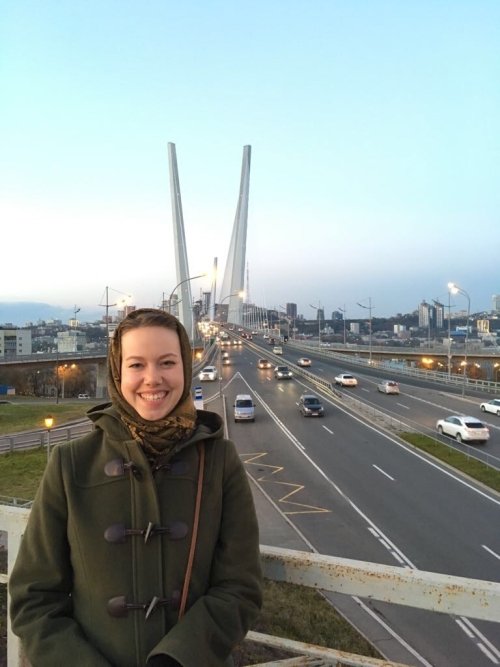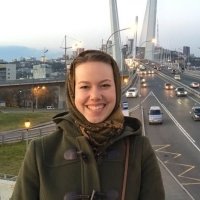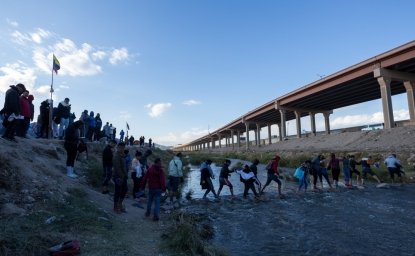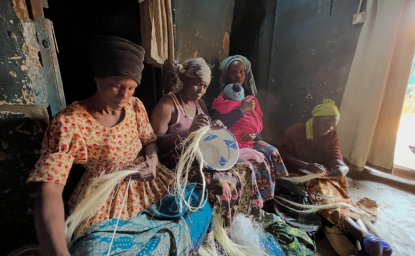
Q: Describe your background and what brought you to the Wilson Center.
I am a cultural anthropologist, interested most broadly in how people negotiate political identities at an everyday level. I started studying Russian as an undergraduate at Smith College, where I became fascinated by the collapse of the Soviet Union and how people experienced political, economic, and social transformations. Understanding these changes led me to study abroad in Russia in college, then to do Fulbright research in Kazakhstan on post-Soviet nation-building projects, and to pursue a PhD in Anthropology at the University of Massachusetts-Amherst. My current research focuses on how officials and migrants negotiate Russia’s migration and diaspora policies and navigate hierarchies of belonging on Russia’s border with China.
As an anthropologist, I conduct interviews and participant observation—a method that involves immersing yourself in the daily activities of your participants. For my project, this meant spending time with migrants as they went about their daily lives, chatting with them over tea at their workplaces and homes, playing with their children at the playground and walking around their neighborhoods, and waiting in line at government offices as they applied for Russian citizenship. After obtaining permission from the local government, I then also conducted participant observation in local offices, where I observed encounters between migrants and officials as both navigated together Russia’s various migration and citizenship policies. By spending extended time with and observing people’s interactions with one another in the Russian Far East, I gained unique insight into the complexity of Russia’s migration policies and bureaucracy. I wanted to come to the Kennan Institute to learn how to communicate what I learned to a broader audience beyond academia.
Q: What project are you working on at the Center?
This summer I am finishing my current book project, Ambiguous Inclusion: Transforming Migrants into Russian Compatriots on the Border with China, which examines how Soviet legacies of internationalism and rising Russian nationalism influence debates about and experiences of belonging. Based on 13 months of ethnographic fieldwork conducted between 2015 and 2017 in Moscow and Vladivostok, I show officials and migrants negotiate Russia’s migration policies to legally transform individuals from refugees and labor migrants from Ukraine, Kazakhstan, Tajikistan, Uzbekistan, and Bolivia into Russian compatriots, eligible for expedited citizenship and state benefits.
I am also writing an article that traces various iterations of resettlement programs to the Russian Far East from the late imperial period through today. When I first arrived in Vladivostok in 2016 and would tell people that I was studying the Resettlement of Compatriots Program, which offers citizenship in as little as three months to ethnic Russians and Russian speakers, people would often tell me that their family had been pereselentsy (“resettlers”) from Ukraine at the end of the 19th century. Officials would also tell me that they were well-suited to hosting refugees from Donbass after 2014 because of the region’s Ukrainian heritage. In the Library of Congress, I am exploring newspaper articles, memoirs, and other materials that advertise and depict earlier resettlement programs to compare them with recent state initiatives to attract ethnic Russians and Russian speakers to the border with China.
Q: How did you become interested in your current research topic?
I became interested in migration to Russia while conducting research for an earlier project in Kazakhstan in 2014. I observed from Almaty the Euromaidan demonstrations, Yanukovych fleeing Ukraine, the annexation of Crimea, and the war begin in Donbass. Many of my colleagues, friends, and acquaintances spoke about their concerns about their futures as Russian speakers in Kazakhstan. To my surprise, and in contrast to American coverage of Ukraine, at that time they did not fear intervention from Russia but rising Kazakh nationalism. That spring it seemed that suddenly everyone around me was talking about immigrating to Russia through the Resettlement of Compatriots Program, a state initiative that offers expedited citizenship to ethnic Russians, Russian speakers, and those spiritually and culturally connected to the Russian Federation. Fascinated by how the Russian state promoted the program abroad, I decided to follow several acquaintances as they moved from Kazakhstan to Russia to obtain citizenship through the program in 2015.
Q: Why do you believe that your research matters to a wider audience?
My research on migration, processes of racialization, and national identity on the Russia-China border reveal larger tensions in what it means to belong in Russia today. I found that many of those who immigrate to Russia through the resettlement program experience challenges adapting to life in Russia, despite their privileged status as Russian compatriots, invited to return to the homeland. Compatriot-immigrants’ uneasiness reflects hierarchies of belonging, shaped by complex configurations of ethnicity, race, language, and culture. While I found that officials and migrants alike drew on collective memories of Soviet internationalism and the Friendship of Peoples to call for a broad understanding of who should be included as a Russian compatriot and citizen, at the same time, many compatriot-immigrants felt they had to adopt practices to pass as ethnic Russian. My research lends insight into the racialization of ethnicity and citizenship in Russia and how beliefs about cultural similarities can coexist with narratives of difference, so that inclusion can be equally as violent as exclusion, as evidenced by Russia’s full-scale invasion of Ukraine in 2022.
Q: What is the most challenging aspect of your research?
The processes of othering I write about in my book seem particularly relevant now and that is what is the most challenging. Many of those I conducted research with in Primorskii krai in 2016–2017 were Ukrainian citizens, displaced from Donbass, who had obtained Russian citizenship because they did not have other options at the time (as with today’s situation, officials channel Ukrainian citizens into the compatriots program, which provides Russian citizenship, rather than granting refugee status), such as going to Europe. Some of them had returned to Ukraine since my fieldwork concluded and have faced challenges being recognized as refugees in Europe because they are now Russian, not Ukrainian citizens. I also worry about friends and acquaintances, who may be drafted, and have heard stories of naturalized Russian citizens being forced to give up their citizenship if they do not fight. Finally, I am disappointed by those I know, who have supported the war, and officials I know in Primorskii krai, who are now tasked with resettling Ukrainian women and children. Who knows if they agree with what they are doing, and it is very challenging now to do ethnographic research in the region.
Q: What do you hope the impact of your research will be?
I often notice a disconnect between the Russia represented in American popular discourses and my own experiences, especially having lived in Vladivostok, which is nearly 4,000 miles and seven time zones away from Moscow and on the border with China and North Korea. This includes an overemphasis on Moscow and depictions of Russian citizens as ethnic Russians, and I wonder, “Which Russia or whose Russia are we talking about?” I hope that my research will convey the diversity of people who live in Russia and the complex interactions and logics that shape people’s experiences and perspectives.
The opinions expressed in this article are those solely of the author and do not reflect the views of the Kennan Institute.
Author

Assistant Professor of Anthropology, Maxwell School of Citizenship and Public Affairs, Syracuse University

Kennan Institute
After more than 50 years as a vital part of the Wilson Center legacy, the Kennan Institute has become an independent think tank. You can find the current website for the Kennan Institute at kennaninstitute.org. Please look for future announcements about partnership activities between the Wilson Center and the Kennan Institute at Wilson Center Press Room. The Kennan Institute is the premier US center for advanced research on Eurasia and the oldest and largest regional program at the Woodrow Wilson International Center for Scholars. The Kennan Institute is committed to improving American understanding of Russia, Ukraine, Central Asia, the South Caucasus, and the surrounding region through research and exchange. Read more







